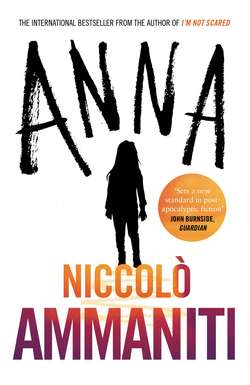Читать книгу Anna - Niccolo Ammaniti - Страница 6
На сайте Литреса книга снята с продажи.
ОглавлениеHe was three, maybe four years old. He sat quietly on a small synthetic leather armchair, chin bent over his green T-shirt, jeans turned up over his trainers. In one hand he held a wooden train which hung down between his legs like a rosary.
On the other side of the room the woman lying on the bed might have been anywhere between thirty and forty. Her arm, covered with red blotches and dark scabs, was attached to an empty drip. The virus had reduced her to a panting skeleton covered with lumpy dry skin, but it hadn’t succeeded in robbing her of all her beauty, which showed in the form of her cheekbones and her turned-up nose.
The little boy raised his head and looked at her, grasped one arm of the chair, climbed down and walked over to the bed with the train in his hand.
She didn’t notice him. Her eyes, sunken in two dark wells, stared at the ceiling.
He toyed with a button on the dirty pillow. His fair hair covered his forehead; in the sunlight that filtered through the white curtains it looked like nylon thread.
Suddenly the woman rose up on her elbows, arching her back as if her soul was being torn from her body, clutched the sheets in her fists and then fell back, coughing convulsively. She tried to swallow air, stretching her arms and legs. Then her face relaxed, her lips parted and she died with her eyes open.
Gently the little boy took hold of her hand and tugged at her forefinger. He whispered: ‘Mama? Mama?’ He put the train on her chest and ran it over the folds in the sheet. He touched the blood-caked plaster which hid the needle of the drip. Finally he went out of the room.
The corridor was dimly lit. The beep beep of a medical device came from somewhere or other.
He passed the corpse of a fat man crumpled up on the floor beside a wheeled stretcher. Forehead against the floor, one leg bent in an unnatural position. The light blue edges of his smock had pulled apart, revealing a greyish-purple back.
The little boy staggered on uncertainly, as if he couldn’t control his legs. On another stretcher, near a poster about breast cancer screening, and a photograph of Liège featuring St Paul’s Cathedral, lay the body of an old woman.
He walked under a crackling neon light. A boy in a nightgown and foam-rubber slippers had died in the doorway of a long ward, one arm forward, the fingers contracted into a claw, as if he were trying to stop himself being sucked down into a whirlpool.
At the end of the corridor the darkness struggled with gleams of sunlight that entered through the doors at the hospital entrance.
The little boy stopped. To his left were the stairs, the lifts and reception. Behind the steel counter were PC monitors overturned on desks and a glass screen shattered into thousands of little cubes.
He dropped the train and ran towards the exit. He closed his eyes, stretched out his arms and pushed the big doors, disappearing into the light.
Outside, beyond the steps, beyond the red and white plastic ribbons, were the outlines of police cars, ambulances, fire engines.
Somebody shouted: ‘A kid. There’s a kid . . .’
The little boy covered his face with his hands. An ungainly figure ran towards him, blotting out the sun.
The little boy just had time to see that the man was encased in a thick yellow plastic suit. Then he was snatched up and carried away.
